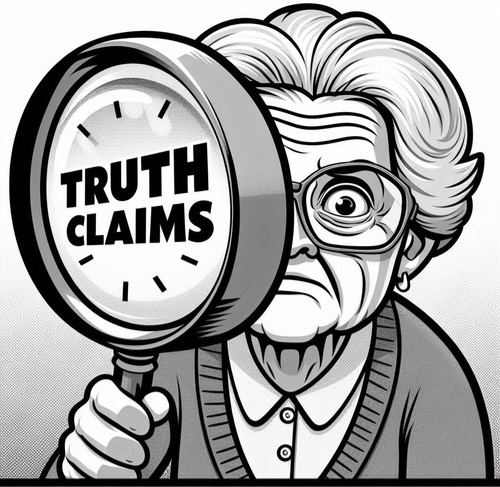Three Vital Tests to Evaluate Truth Claims
The Three-Test Filter for Truth Claims
In our pursuit of truth how can we confidently assess whether a particular claim or belief is valid or not? Philosophers and apologists often point to three key aspects or “tests” that any purported truth should be able to pass—internal coherence, external correspondence, and functional adequacy. Let’s explore each of these vital tests and see why they are important lenses that can help us evaluate truth claims:
Internal Coherence—The Test of Logical Consistency
The first hurdle any truth claim must clear is that of internal coherence or logical consistency. In other words, is the claim free of contradictions within its own principles, premises and conclusions? A logically incoherent claim is self-defeating.
Illustration: Imagine someone claimed “There are no truths”: this statement fails the internal coherence test because it contradicts itself. If there are no truths, the very statement “there are no truths” cannot be true. An inconsistent claim such as this is irrational by nature.
External Correspondence—The Test of Factual Alignment
Even if a claim is internally coherent, it must still pass the test of external correspondence by aligning with objective, empirical reality. A truth claim may be logically consistent but still fail to accurately map to facts about the physical world, observable evidence or existing knowledge.
Illustration: Someone could construct an imaginative fantasy story with internally consistent fiction rules and characters. But if this story contradicts established facts about physics, history or verifiable data, it fails the external correspondence test for truth in those areas contrary to known realities.
Functional Adequacy—The Test of Liveability
The final vital test is that of functional adequacy, asking whether a belief or truth claim can be consistently lived out and provide a coherent, flourishing framework for human existence. A truth claim may be logically consistent and align with facts, but if embracing it renders life itself incomprehensible or destructive, its truth value is greatly undermined.
Illustration: A worldview or philosophy that denies objective morality, human rights or intrinsic human value may seem internally coherent on paper. But when applied fully, it enables horrific evils, dehumanisation and social chaos that contradicts our fundamental moral intuitions and experience of human thriving. Such a view fails this test of functional adequacy.
Any robust truth claim must be able to withstand scrutiny on all three of these tests—logical consistency, factual correspondence, and real-world liveability. Running proposed truth statements through this triple filter helps expose contradictions and errors while validating genuine knowledge about reality.
As we evaluate truth claims in philosophy, science, ethics, religion and every arena of life, wisely applying these three tests can save us from falling into deception, delusion or destructive falsehoods. Prioritising internal coherence, external correspondence and functional adequacy puts us on surer footing to discern truth from fiction.
Related Reads
Editor's Pick

Why Do People Hate the Doctrine of Election?
…WHEN THEY REALLY SHOULDN’T Few Bible doctrines provoke stronger reactions than election. The idea that God chose some for salvation [...]

The Doctrine of Providence: Does God Really Govern All Things?
You’re sitting in the doctor’s office when the diagnosis lands like a thunderclap. Your mind races: Why this? Why now? [...]

No Decay, No Defeat: What It Means That Christ’s Body Saw No Corruption
On the Day of Pentecost, Peter stood before thousands and made a startling claim: David's body decayed in the tomb, [...]
SUPPORT US:
Feel the Holy Spirit's gentle nudge to partner with us?
Donate Online:
Account Name: TRUTHS TO DIE FOR FOUNDATION
Account Number: 10243565459
Bank IFSC: IDFB0043391
Bank Name: IDFC FIRST BANK






